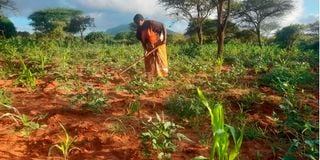Premium
Taita Taveta residents face acute food crisis as drought persists

Ms Jennifer Mwambogho at her farm in Ngolia, Taita Taveta County on January 2, 2023.
Taita Taveta County residents are staring at an acute food shortage owing to the drought experienced in the region.
A spot check by Nation.Africa across the county revealed that some crops had started wilting, dashing the hopes of farmers who were expecting to harvest during this season.
The sorry state of affairs is being experienced in Voi, Mwatate and some parts of Wundanyi and Taveta sub-counties. Smallholder farmers had reduced the acreage for maize farming due to the erratic rains. Nation established that most agricultural fields have no crops.
At Ngolia area in Voi sub-county, farmers who had planted in November had to deal with the infestation of fall armyworms.
Ms Jennifer Mwambogho said the situation had worsened. She said that her family which mainly depends on subsistence farming is not staring at a looming famine.
"We first had to deal with the armyworms by spraying pesticides. But as you can see, the rains have failed so we don't expect to harvest anything this season," she said.
The erratic rains in the region have also made residents look for alternative means to sustain their families. The residents have now turned to charcoal burning amid the rising cost of living.
"Food prices are very high, so some days we sleep on empty stomachs," said Mr Donald Mwalugha.
Ms Fridah Mwake blamed the situation on climate change which has threatened food production.
"Some years back, the seasons were predictable, the rain patterns were predictable, but now things are different," she said.
She said despite following advice from weather experts to plant drought-resistant crops the crops still failed.
"This season, I planted cowpeas and green grams which are yet to mature due to erratic rain patterns," she said.
The residents have called for speedy interventions to avert a looming food crisis. Most locals now rely on food donated by well-wishers.
"The food situation is worsening by the day, I call on the government to place aggressive measures to ensure that we access food," Ms Mwake said.





